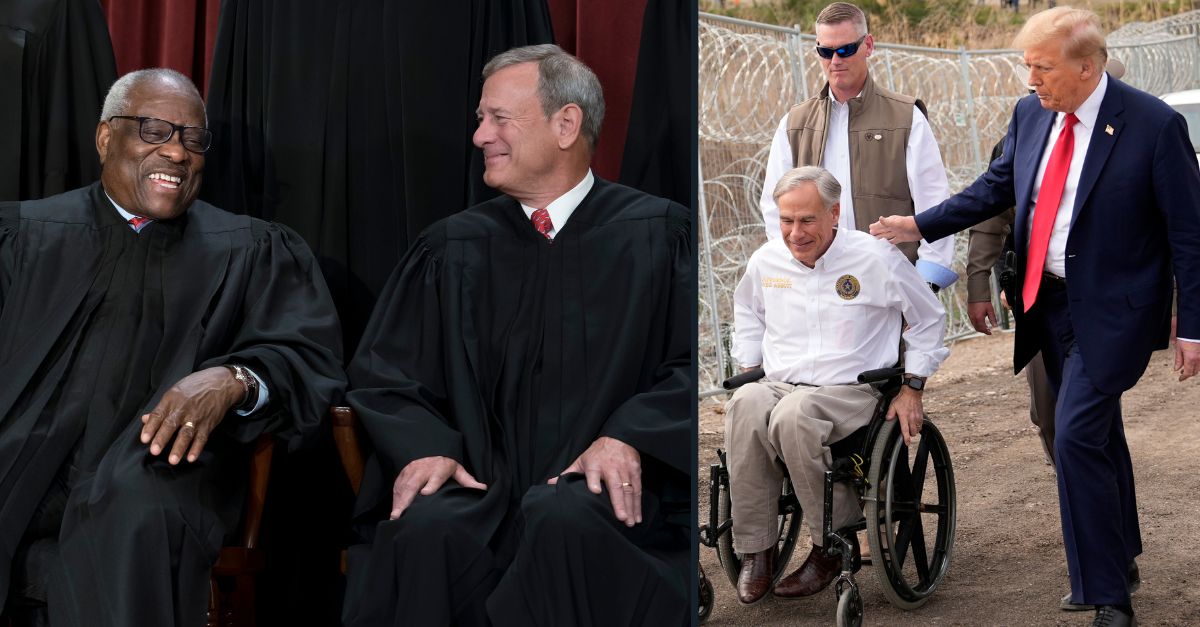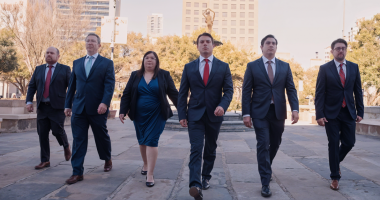
Left: Associate Justice Clarence Thomas and Chief Justice of the United States John Roberts sit for a new group portrait following the addition of Associate Justice Ketanji Brown Jackson, at the Supreme Court building in Washington, Friday, Oct. 7, 2022. (AP Photo/J. Scott Applewhite). Right: Republican presidential candidate former President Donald Trump talks with Texas Gov. Greg Abbott at Shelby Park during a visit to the U.S.-Mexico border, Thursday, Feb. 29, 2024, in Eagle Pass, Texas. (AP Photo/Eric Gay).
The Supreme Court has given the State of Texas until March 11 to respond to the federal government’s request to overturn an appellate court ruling that would allow Texas to put its own immigration policy into effect. Justice Samuel Alito extended the U.S. Court of Appeals for the Fifth Circuit’s stay of its own order until March 13 in response to the Department of Justice’s Monday afternoon filing. The conservative Fifth Circuit vacated a lower court ruling Saturday, sided with Texas to uphold its controversial immigration law, then administratively stayed its order until March 9. Alito issued the solo order Monday evening, because he is the justice assigned to cover emergency filings in the circuit.
The law at issue is Texas S.B. 4, part of Republican Gov. Greg Abbott’s “Operation Lone Star” — a set of anti-immigration laws that included the installation of razor wire and a floating barrier of buoys in the Rio Grande and the addition of thousands of state troopers to patrol the U.S.-Mexico border. Arguably the most legally severe portion of Abbott’s initiatives was the authorization for Texas law enforcement to arrest anyone suspected of illegal border crossing and charge them with crimes ranging from misdemeanors to felonies, then to prosecute and punish with jail time or return to Mexico.
On Feb. 29, Senior U.S. District Judge David Alan Ezra ruled against Texas on the law. Ezra, a Ronald Reagan appointee, said that the law is problematic for a litany of reasons. It violates both the Supremacy Clause and Supreme Court precedent, Ezra said. It also conflicts directly with key provisions of federal immigration law and offends American foreign relations and treaty obligations. Moreover, Ezra said, when the U.S. Constitution afforded states the right to protect themselves from “invasion,” it did not use the term in a way that would include border-crossers, even if the crossing was illegal. More generally, Ezra said, “SB 4 threatens the fundamental notion that the United States must regulate immigration with one voice.”
Ezra called Texas out for “mistak[ing] the figurative for the literal,” and said the Lone Star State’s argument that President Joe Biden had “abandoned” the task of border protection amounted to hyperbole. The judge found that Texas was unlikely to succeed on the merits of the lawsuit filed by advocacy groups Las Americas and American Gateways and issued an injunction that blocked Texas from enforcing SB4.
The New Orleans-based Fifth U.S. Circuit Court of Appeals reversed Ezra’s ruling late Saturday, then immediately issued a seven-day administrative stay of its ruling. When that stay expires next Saturday, the law will go into effect unless the Supreme Court reverses the Fifth Circuit’s order. The appellate court’s opinion has not yet been made public.
The Supreme Court struck down a state law similar to SB4 in 2012 — in that case, from Arizona — and said that regardless of any “understandable frustrations with the problems caused by illegal immigration,” Arizona was not authorized to create its own immigration laws that undermine federal immigration laws.
Although the makeup of the Court has changed significantly since 2012, many of the current justices have ruled against Texas when it has intruded into matters of immigration.
Opponents of SB4 have said hard-line immigration tactics like SB4 make things less safe in many ways and point to the recent death of a migrant woman and two children in the Rio Grande as just one example of results of Texas “cruel, dangerous, and inhumane” policies at the border. Abbott denied responsibility for the incident and said the three were already dead when Texas officers prevented Customs and Border Patrol officers from rendering assistance.
The Supreme Court has not said whether it will hear the case.
Editor’s note: This piece was updated from its original version to include the Court’s order on Monday evening.
Have a tip we should know? [email protected]








